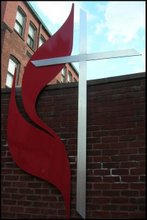Jezebel Envisioned Poetry by Molly Hicks, Master of Divinity student
Methodist Theological School in Ohio
July 2011
Thank you to Molly Hicks for granting me permisson to use her poetry as a devotional. Molly says of Jezebel, "She is vengeful, indeed, but I decided her humanity needed its say, as well." Part two of her poem will be published as a devotional soon.
I. 1 Kings 16: 29-33
The Announcement
When father, Ethba'al, King of the Sidonians – all of Phoenicia,
Told me of my future husband,
I was fearful,
What did I know of this place in the south?
“This will strengthen the alliance of kingdoms,
Israel, Judah and Phoenicia,” he said.
“You will make me proud,
by bringing more prosperity,” he said.
“Then...you can give me a grandson,” he said.
And at that...my heart melted,
I loved him even more,
And I smiled.
Then I began to imagine,
New rivers and mountains,
Beautiful fields of barley and pomegranate bushes,
Vineyards stretched across the desert landscape,
Like a vast green cloth,
Speckled with deep, deep red and purple,
Like blood spattered across the altar of sacrifice.
Ba'al will surely have blessed this place,
And the people will surely welcome me,
Daughter of the high priest, Ethba'al
Meaning “Ba'al is with him.”
He will surely be with me, as well.
New Home
By the next new moon,
Samaria was my kingdom,
And Ahab my king,
I was taken as wife,
And we were blessed by a priest,
But this union was not for Ba'al.
The temple was for Yahweh,
And the land was blessed by Yahweh,
Ba'al would not be happy,
Until he was welcomed, too.
I longed for Sidonia,
From sunrise till the night sky,
My husband was observant and curious,
He asked to know my god,
So I told him,
Every story grandmother had given me,
And I told him,
Every way Ba'al had blessed my life,
And father's as well,
My husband listened.
King Ahab built a great temple for Ba'al,
With an altar,
And Asherah,
The goddess mother, sacred pole.
Then I had a place for Ba'al,
And others could know him,
As they knew their Yahweh,
Here they would find their souls,
They would know true fear,
And kindness.
The new temple lay empty in daylight,
But I learned that some came,
In the first and last light of day,
They arrived in secret,
Hidden by the rising and falling cloak of night,
And they found Ba'al,
And were blessed by him,
It seems many remembered him,
Through their ancestors' time in Canaan,
When the people here lived for Ba'al.
II. 1 Kings 18: 20-40; 1 Kings 19: 1-3
Spiritual Conflict
In the city, I learned Ba'al's prophets,
Arose from Yahweh's people,
Like lions rising miraculously,
From an eternal nap.
The people asked for Ba'al's stories,
They were hungry for memories,
Of their loved ones,
And their gods and goddesses.
I began to feel at home,
In this strange place.
How could so many turn to this Yahweh?
Who is this Elijah, speaking so much untruth?
Before death we must find balance in our souls,
Ba'al brings this balance.
We receive Ba'al's happiness through rain,
A piece of him, a drop of his lifeblood,
Spared to thank us for serving him so well.
We accept the rain and grow our sheep, our crops,
We burn offerings of grains and animals,
And Ba'al is renewed, his lifeblood returned,
In honor of giving us such bounty.
He gives so much when we are good.
Once the whole of this land,
Knew Ba'al through storms as well,
Yes, he has anger, too,
His voice a great rush of thunder,
His breath weaving through the trees,
A ferocious wind,
His tears of shame churning great floods and destruction,
We listen to this anger,
We sacrifice ourselves in these deadly times,
And repent.
Ba'al, the god of all people,
The cult of Yahweh is for Ba'al,
They must see this and call it by his name.
When I heard of the killings by the brook,
By Elijah's swords,
I felt the anger of Ba'al,
Arise within my own blood and body.
My message to Elijah was clear,
The gods willed upon me,
The need to end your life,
For you, and you alone,
Can be the sacrifice to Ba'al,
For the deaths you have caused,
In your false god's name.
Molly Hicks



